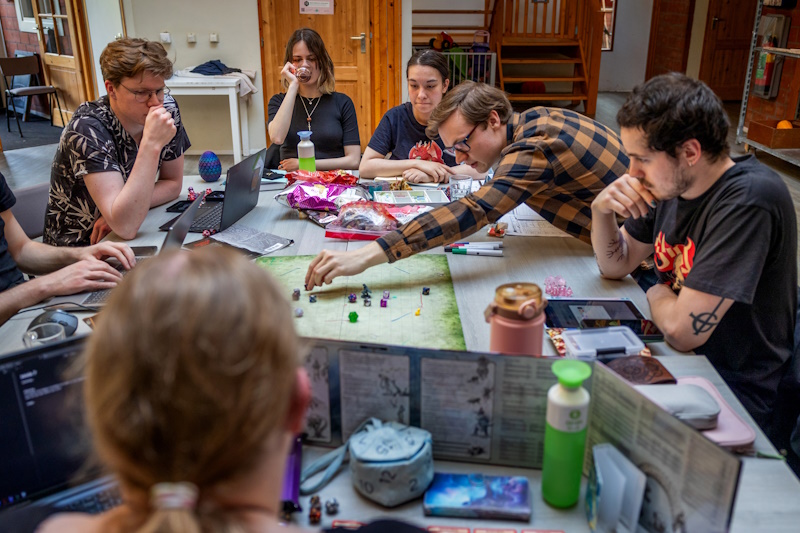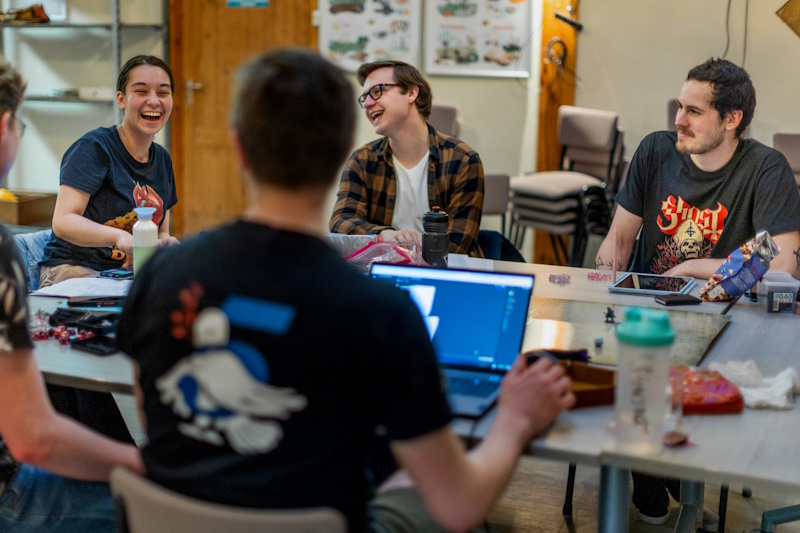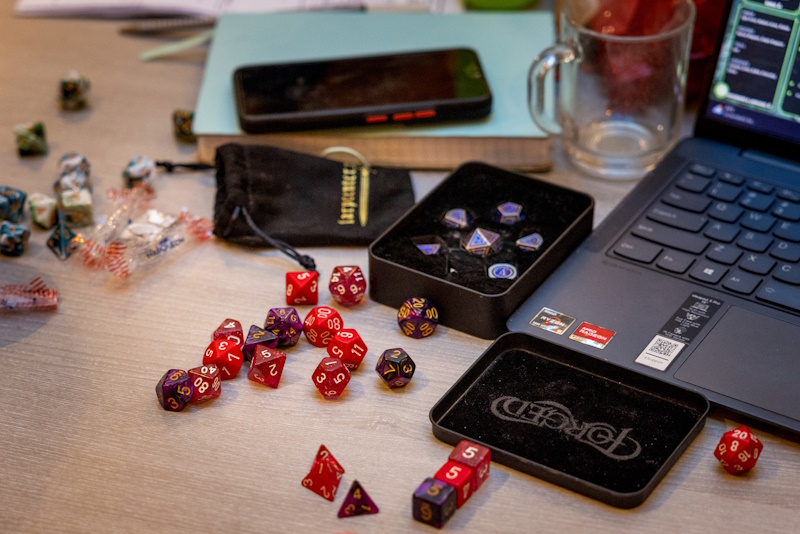A successful meeting of the Dice Roller Society means saving wizards and dragon eggs. WIN reporter Yara played along for an evening.
“After a long day of travel, you come to an inn built on the remains of a crumbling tower. The smell of delicious hot wings emanates from the inn. It is said that the owner prepares them fresh. You look inside and see that the inn is empty…” The narrator pauses briefly to look intently at the three boys sitting at his table. In front of them is a map and Lego figures with elf ears and dragon heads. “What do you want to do?”
Wild plans

Every two weeks, the Dungeons & Dragons players meet at the De Schellerhoeve neighborhood farm in Zwolle-Zuid. From seven to ten they immerse themselves for an evening in a world of dragons, elves, wizards and this time: hot wings. Last September, initiators Yo-Lin Inkelaar and Gijs Jansen, both Information & Communication Technology students at Windesheim, organized the first evening. Yo-Lin: “Gijs often has wild plans. Once he fantasized about how fun it would be to start a DnD club. I am someone who then takes action. My hands were itching to organize this.”
The goal of the club? That everyone has a pleasant evening. “It’s about doing something we enjoy together. That is why we took the atmosphere of our study programme as a basis: it feels safe there and we respect each other.” The ‘Dice Roller Society’, as Yo-Lin and Gijs call their club, is doing well. Tonight there are twenty players, two of whom have never participated before.
Maps and snacks
At six o’clock the first ones trickle in for a communal meal. In addition to ICT students, there are teachers and even people who do not study or work at Windesheim at all. “Some of us wonder how they found us,” Yo-Lin laughs. “But everyone is more than welcome!”
At seven o’clock the players gather in the living room of the farm. Yo-Lin walks around making gestures with her hands to tell who is playing with whom. She forms groups of four to six players and sends them to tables with game masters (the so-called Dungeon Masters). Brown curtains are drawn around the tables to minimize distractions. Printed maps, snacks, twenty-sided dice and Lego figures emerge from bags. Each figure represents a player character. The Dungeon Masters hand out pieces of paper with descriptions of orcs, priests, wizards and fighters. When all players have chosen which character they want to be in the game, the chatter turns to silence. Everyone is ready to play.
Shapeshifters
“We’re going into the inn as quickly as possible to get hot wings!” shouts the cleric (priest) of the group. The other two players nod enthusiastically. “So we open the door and walk in,” he continues. “Is my character tall enough to climb onto a bar stool?” The fighter and the orc laugh, the wizard shrugs.
“The back door swings open and the innkeeper comes in to greet you,” says the Dungeon Master. He pauses to look at his laptop, where he has a document with the game flow and all possible scenarios. He puts on a deep voice and changes into the character of the innkeeper. “I’m afraid you have come at the wrong time,” he reads. “The inn is closed, but I’m happy to prepare hot wings for you to help you on your way.” The players think he looks suspicious and decide that they want to check out the top floor of the inn while the innkeeper goes to the kitchen.
Dragon Parents

“On the top floor you end up in a room with a bed and closed chest,” says the Dungeon Master. “Above the bed hangs a family portrait of two dragon parents with an egg.” The cleric takes charge again: “I find that chest interesting. I put my hand on it to see if I can open it.” The Dungeon Master starts beaming, shifts to the edge of his seat and says: “When you put your hand on the box, you feel something sticky. It looks like scales are appearing. Two big eyes blink. The box comes to life and starts to roar!” The players are now also moving to the edge of their seats.
Dungeons and Dragons has become popular again thanks to the popular Netflix series Stranger Things, in which the game plays a crucial role. Yo-Lin notices that more and more people have heard of DnD, but few really know what it means. “It’s nice that it is gaining more and more brand awareness. Hopefully the stigma surrounding roleplaying games will disappear a bit.” She notices that many people think DnD is a game for nerds. “That’s a shame, although sometimes I understand where they come from. Most players here are IT students, but that doesn’t change the fact that everyone can enjoy this game. Maybe the nerds are just the first to find out that this is a cool thing to do,” laughs Yo-Lin.
Ward Bannink, player and Windesheim lecturer at the Information & Communication Technology study programme, supports Yo-Lin. “It is not only fun, but you also learn a lot from it. It is a team game in which you practice your social skills. You have to work together, occasionally take charge and exercise power. That gives you self-confidence.” For some, it is simply easier to express themselves in a character than in the real world, think Yo-Lin and Ward. “But above all, it’s just fun to be in such a different world for a few hours and let go of everything around you.” Ward is convinced that it is not only nerds who are enthusiastic about this ‘escapism’. “That can be nice for everyone.”
Shapeshifters
Not only the chest, but also the bed now grows scales and starts to move. “You’ve probably realized by now that the bed and the chest are shapeshifters. These monsters take the form of an object when at rest, but now come to life and are clearly not happy that you are disturbing them. They become aggressive. What are you going to do?” asks the Dungeon Master. “I strike with my sword!” shouts the fighter. “Then you can roll,” the Dungeon Master replies, pointing to the twenty-sided die.
The fighter rolls seventeen and the Dungeon Master quickly checks his laptop to see if that’s enough to hit the bed. He nods happily and picks up the scenario in which the bed is defeated. The players are safe again. With the shapeshifters at peace, the Dungeon Master tells them that the monsters are being held captive by the innkeeper, while the innkeeper himself is looking for a dragon egg. He will feed anyone who gets in his way to the monsters.
The players have thoroughly searched the inn and surroundings and have now ended up in a mysterious tower next to the inn, where a challenge awaits them per floor. When they reach the top floor, they see a dragon egg, which they recognize from the family portrait in the inn.
Who has my egg?!
The innkeeper stands in front of the egg with an evil smile, the Dungeon Master says. “We have to beat him down, boys, he’s stealing the egg!” the cleric exclaims. The rest of the players start laughing and then nod in agreement, but the Dungeon Master interrupts: “In the distance you hear the nasty roar of a dragon about to breathe fire. Great wings appear above the tower.” The Dungeon Master clears his throat. “Who has my egg?!,” he shouts in his darkest, dragon-like voice. By rolling the dice high enough, players convince the dragon that the innkeeper is the bad guy who wanted to steal the egg.
“The dragon spreads its wings,” the Dungeon Master continues, “grabs the innkeeper with its enormous claws, takes the egg in its mouth and flies away never to be seen again. The evil innkeeper has disappeared and the dragon has his egg back. You have restored the peace around the inn. Congratulations!”
After three hours of playing, there is a sigh of relief at the table. As they roll up the cards and put the dice back in velvet bags, the players talk about their favorite moments. The Dungeon Master explains where the game could have gone differently if the players had made different choices. For example, they passed by talking mushrooms in the forest that could have given hints, and the fight with the shapeshifters would have lasted much longer if the fighter had not immediately rolled so high.
The games at the other tables are now almost done. A few walk to the table where the game is still being played to watch, but most leave for home, hoping not to encounter any evil trolls along the way.
Everyone is welcome to join us on a Wednesday evening at the De Schellerhoeve neighborhood farm. You can register via: instagram.com/dicerollersociety
Crash course Dungeons & Dragons

Dungeons and Dragons is a ’tabletop roleplaying game’, a role-playing game that you play at the table, like a board game without a board. It has been around since the 1970s. The game leader, or ‘Dungeon Master’, prepares the game. He comes up with a storyline beforehand or looks up an existing DnD story and thinks about what the players need to do to bring their adventure to a successful conclusion.
Has the Dungeon Master finished his preparations? Then it’s time to play. Grab your dice and choose a character, such as an elf, wizard or fighter. Everyone has their own strengths, weaknesses and weapons. You can create your own character, or choose a well-known DnD character.
During the game, the Dungeon Master always tells where the players are and what is happening. The players choose how they respond to the situation presented and thus together determine how the story proceeds. In DnD you don’t play against, but with each other. As a group you go through the story of the Dungeon Master.
Will the players find themselves in a dangerous situation? Then they can choose to enter into battle and it is time to roll the dice. The Dungeon Master has determined in advance for each situation how high each player must roll the dice to win a battle or to succeed in an action (such as hitting with your sword or freeing a fellow player). Does this not work? Then fellow players can often help or a fight lasts longer. In extreme cases, a character may die, but this does not mean the game is over. Someone can often be brought back to life, for example by a magic spell.
The game is finished once the group reaches the end of the story that the Dungeon Master created for them. This can take a few hours if you play a so-called ‘one shot’. But a game can also extend over months or even years.
Text: Yara Meilink
Photos: Herman Engbers
